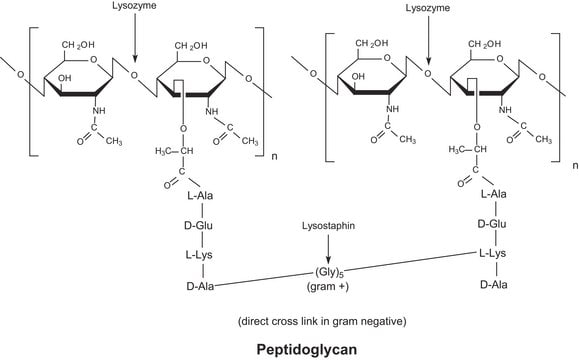S2763
Anti-Sheep IgG (whole molecule) antibody produced in donkey
affinity isolated antibody, lyophilized powder
Faça loginpara ver os preços organizacionais e de contrato
About This Item
Produtos recomendados
fonte biológica
donkey
Nível de qualidade
conjugado
unconjugated
forma do anticorpo
affinity isolated antibody
tipo de produto de anticorpo
secondary antibodies
clone
polyclonal
Formulário
lyophilized powder
técnica(s)
quantitative precipitin assay: suitable
temperatura de armazenamento
2-8°C
modificação pós-traducional do alvo
unmodified
Categorias relacionadas
Aplicação
Anti-Sheep IgG (whole molecule) antibody produced in donkey was covalently coupled with epoxy beads and used as control in immunoprecipitation.
Applications in which this antibody has been used successfully, and the associated peer-reviewed papers, are given below.
Immunoprecipitation (1 paper)
Immunoprecipitation (1 paper)
Ações bioquímicas/fisiológicas
IgG antibody subtype is the most abundant of serum immunoglobulins of the immune system. It is secreted by B cells and is found in blood and extracellular fluids and provides protection from infections caused by bacteria, fungi and viruses. Maternal IgG is transferred to fetus through the placenta that is vital for immune defense of the neonate against infections.
forma física
Lyophilized from 0.01 M sodium phosphate, 0.015 M sodium chloride, pH 7.2.
Reconstituição
Reconstitute with 0.135 M sodium chloride.
Exoneração de responsabilidade
Unless otherwise stated in our catalog or other company documentation accompanying the product(s), our products are intended for research use only and are not to be used for any other purpose, which includes but is not limited to, unauthorized commercial uses, in vitro diagnostic uses, ex vivo or in vivo therapeutic uses or any type of consumption or application to humans or animals.
Não está encontrando o produto certo?
Experimente o nosso Ferramenta de seleção de produtos.
Código de classe de armazenamento
13 - Non Combustible Solids
Classe de risco de água (WGK)
WGK 3
Ponto de fulgor (°F)
Not applicable
Ponto de fulgor (°C)
Not applicable
Equipamento de proteção individual
Eyeshields, Gloves, type N95 (US)
Escolha uma das versões mais recentes:
Já possui este produto?
Encontre a documentação dos produtos que você adquiriu recentemente na biblioteca de documentos.
Agnieszka Gambus et al.
The Journal of biological chemistry, 286(13), 11855-11864 (2011-02-02)
In late mitosis and G1, Mcm2-7 are assembled onto replication origins to license them for initiation in the upcoming S phase. After initiation, Mcm2-7 provide helicase activity to unwind DNA at the replication fork. Here we examine the structure of
Raiany A Freitas et al.
Life sciences, 262, 118552-118552 (2020-10-10)
Angiotensin-1-7 [Ang-(1-7)] is an essential peptide of the renin-angiotensin system that promotes benefits modulating effects in different tissues. Similarly, interleukin-10 (IL-10) exhibits an immunomodulatory action on the vasculature. This study aimed to evaluate whether Ang-(1-7) levels attenuates vascular contractile response
Soumya Palliyil
Methods in molecular biology (Clifton, N.J.), 1673, 325-352 (2017-11-14)
A number of bacteria use a class of chemical compounds called acyl-homoserine lactones (AHLs) as quorum sensing (QS) signals to coordinate their behavior at the population level, including pathogens like Pseudomonas aeruginosa. Blocking QS using antibodies is an attractive strategy
S Hashira et al.
Pediatrics international : official journal of the Japan Pediatric Society, 42(4), 337-342 (2000-09-15)
Maternal immunoglobulin G (IgG), transferred across the placenta to the fetus during intrauterine life, is an important component of the neonatal immunological defence mechanisms against infection. There is controversy with respect to differences in placental transfer of the different IgG
Nossa equipe de cientistas tem experiência em todas as áreas de pesquisa, incluindo Life Sciences, ciência de materiais, síntese química, cromatografia, química analítica e muitas outras.
Entre em contato com a assistência técnica



